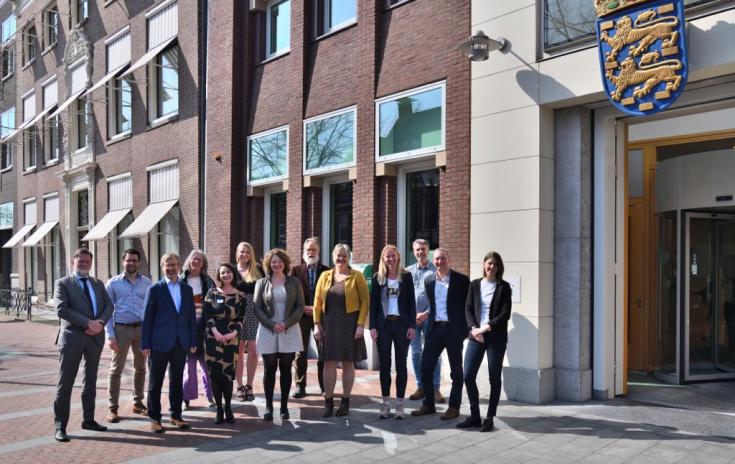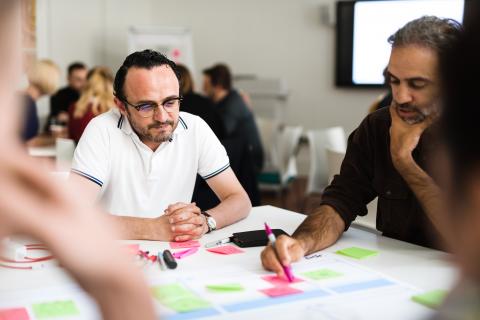Boosting community resilience by small scale funding in Fryslân

On 23 and 24 March 2022, the Policy Learning Platform organised an onsite peer review for the Province of Fryslân in the City of Leeuwarden, on “How to boost community resilience by small scale funding”.
Consequently, the peer review put the spotlight on the Open Community Fund (Iepen Mienskipsfûns – IMF) of the Province, an easily accessible funding instrument supporting bottom-up local development initiatives.
As stressed by the experts of the Policy Learning Platform, the IMF represents an already successful and practice-proven policy tool, characterised by lean, flexible, and decentralised management arrangements.
Nonetheless, the Province of Fryslân is currently reviewing how to enhance the outreach and impact of the IMF programme, notably the grant scheme element used for community development support.
The peers
Under the moderation of our Project manager Thorsten Kohlisch and thematic expert Marc Pattinson, four peers from Denmark, Belgium, Slovenia, and the Netherlands shared with the host region their experiences and suggestions for promoting community funding schemes. The four talented peers were:
- Alette Skov-Hansen (Municipality of Syddjurs, DK)
- Alexander Krings (East Belgium, BE)
- Emilia Stojmenova (University of Ljubljana, SI)
- Lieselot Vandebussche (Free University of Amsterdam, NL)
Policy challenges
Two policy challenges were at the heart of the exchanges between the peers and the host:
- How do we reach and approach target groups that do not know the IMF, how to identify their needs and keep them activated within the community?
- What indicators or methods can the Province of Fryslân use to measure the (societal) impact of (IMF) community projects?
Key learnings
Relevant site visits led by the IMF team allowed the peers to gain very valuable insights into the local community spirit in the region, as well as the practical challenges faced by local beneficiaries on the ground.
The active participation of stakeholders such as the Leeuwarden-Fryslân 2028 European Capital of Culture legacy team ARCADIA further helped contextualise the situation.
Thus, building on two days of intense and very rich exchanges, the four peers gave concrete and actionable suggestions for the strategic development of the IMF.
Click below to see some of the suggestions made by the peers:
- Target less-represented community groups by using intermediaries, facilitators and network leaders. Public municipalities, voluntary and private networks can be used to interact with relevant target groups.
- Nominate Local Heroes to build ownership and express appreciation.
- Follow the mantra “we are coming to you to discuss your needs” when delivering targeted communication and promotional activities.
- Celebrate and promote project results through events and festivals co-created with the supported communities. Join pre-existing events to maximise impact and „go where targets gather “, linking with existing actions such as the legacy programme of the European Capital of Culture project.
- From IMF to IMS (S = support): consider combining the grant scheme with networking and capacity-building measures to strengthen the commitment, resilience and project management skills of local communities in the long-run.
- Application process: Project pitching is a good means to advise, combine, shape projects towards key provincial policy objectives and join up with other potential projects to avoid duplication and maximise complementarities.
- Participatory Monitoring: Involve stakeholders and beneficiaries in the definition and monitoring of relevant indicators.
- Policy governance (and funding) continuity is important … keep the „plough straight“ !
- Do not underestimate the link between local community support and the grand challenges of today. Community Development funds create and support strong communities that are more pro-active, resilient and independent.
In fact, as underlined by all participants, the value of the IMF for the future of Fryslân reaches far beyond the small-scale funding provided for local community initiatives. By working closely with local project owners, regional decision-makers can build closer ties with local communities.
Thus, regaining the trust in public policymaking which is necessary to tackle the various broader challenges of today’ world, such as economic, health, climate and energy transitions and overall regional resilience.
You can discover all insights and suggestions in the follow-up report!
Apply for a peer review!
Find solutions to your policy challenges with our experts and peers!
Peer Review - Fryslân final report
Final report on the Fryslân peer review

